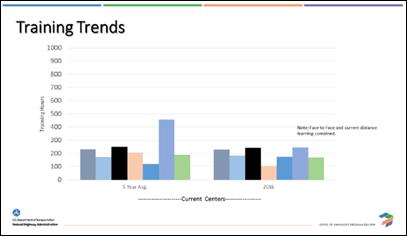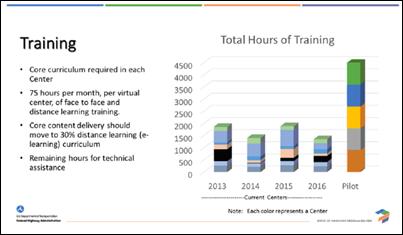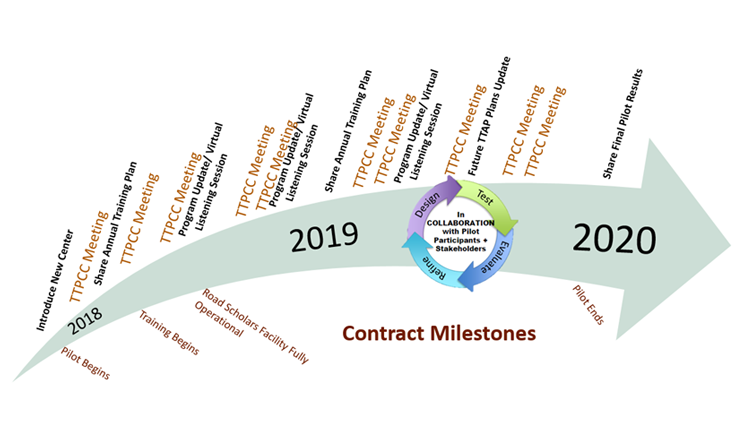In 2016, FHWA evaluated the existing TTAP program effectiveness in its delivery of services to the tribes. FHWA reviewed the TTAP Center agreements and, more importantly, looked through the data that the Centers themselves provided to FHWA on the delivery of training and technical assistance to the tribes. Performance data is collected annually from all LTAP and TTAP Centers. FHWA compared the 5-year total training hour average for the TTAP Centers with LTAP Centers of comparable funding. The results were informative. The TTAP centers 5-year training hour average is 233 hours and that average for LTAP Centers, with comparable funding, is over twice that amount - 576 hours. In calendar year 2016 the training hours were equally striking 194 (TTAP) compared to 490 (LTAP).

Detailed description of Training Trends Chart
Training trends indicate that the TTAP centers 5-year training hour average is 233 hours and that average for LTAP Centers, with comparable funding, is over twice that amount - 576 hours.
In addition to the raw numbers, the review indicated that some of the regions served by the TTAP Centers were not receiving training in the focus areas for the program that were established at the strategic level - Infrastructure Management, Safety, and Workforce Development. Comments also expressed by tribes indicated that some felt underserved by the TTAPs and the training format was not sufficient to build workforce skills.
The Center for Local Agency Support focus centered on how the TTAP can best meet the needs of the tribes in transportation training and technical assistance. The following questions were evaluated by FHWA:
Based on program analysis, the input gathered from the Tribal Transportation Program Coordinating Committee (TTPCC), and feedback from our engagement with the tribes, FHWA moved forward with a centralized delivery model. The new model increases the amount and types of education and technical assistance services available to the tribes and supports consistent and uniform training and training materials across the twelve Bureau of Indian Affairs regions. It will supplement face to face training with e-learning options.

Training
The slide also shows a chart indicating the total number of training hours per Center for the years 2013 through the Pilot period
FHWA will also engage with tribal governments as requested at regional and national meetings for the purpose of exchanging information and input on the action. The FHWA will also continue to work with and update the TTPCC throughout the pilot.

Summary of Contract Milestones graphic
Contract milestones in 2018 include the Pilot Begins, the Training Begins, the Road Scholars Facility becomes fully operational, with the Pilot ending in 2020. TTPCC meetings, program updates and virtual listening sessions occur at regular intervals from 2018-2020.
Informational webinars continue to be held on the restructuring of the Tribal Transportation Assistance Program (TTAP) to solicit Tribal input, opinion, and feedback. Below are the links to the recorded webinars.
Informational webinars on the restructuring of the Tribal Transportation Assistance Program (TTAP) to a centralized delivery model were held in June 2017 to solicit tribal input, opinion, and feedback on a proposed two-year pilot. Each webinar concluded with a unique Q&A session and chat room. A follow-up letter summarizing 'next steps' was sent out to tribal leaders in July 2017.
Tony Furst, FHWA's Chief Innovation Officer, provided remarks on the TTAP restructuring during the plenary session of the National Tribal Transportation Conference
The UVA, Center for Transportation Studies (CTS) was selected as the Tribal Technical Assistance Program Center under the two-year pilot.
The new TTAP Center is up and running. This webinar shares the 2018 training program, the technical assistance process and reveal the new website.